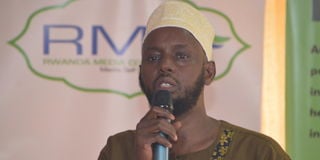Experts: COP27 in Egypt should correct climate injustices in Africa

Mohamed Adow, Director of Power Shift Africa, a climate think-tank based in Nairobi addresses journalists during the Pre-COP27 Africa Media Conference for African Environmental journalists in Kigali City, Rwanda on September 22, 2022.
As the world and private sector leaders prepare to unite for COP27, a climate think tank says this will present an opportunity to correct climate injustices in Africa.
The Director of Power Shift Africa, a Nairobi-based non-governmental organisation, Mr Mohamed Adow, said the global climate meeting to be held in El-Sheikh city in Egypt from November 6-18, comes at a time when climate change is affecting the availability of food, energy and is also threatening the stability of economies of many third world countries.
“As we head to the COP27 Africa is disproportionately affected by climate change and many parts of the continent like Northern Kenya are ravaged by extreme drought which has disrupted the livelihoods of millions of poor Kenyans,” said Mr Adow.
He was speaking during the three days Pre-COP27 Africa Media Conference for African journalists that ended at Kigali City in Rwanda on Friday.
The conference was jointly organised by Media for Environment, Science and Agriculture (MESHA), Power Shift Africa and Rwanda Media Commission (RMC).
The conference attracted more than 50 journalists from Kenya, Rwanda, Tanzania, Uganda, Malawi, South Africa, Egypt, Nigeria, and Ethiopia.
COP27 conference
“The COP27 conference in Egypt is a golden opportunity for Africa to come together and make a strong case for climate justice, and climate finance to access the much-needed financial resources to address a myriad of problems in the continent including famine to build a strong resilience system that communities can use to withstand climate change and adaptation,” said Mr Adow.
Mr Adow revealed that over 4 million Kenyans are facing severe drought, and lack of water and blamed the short-term solutions as one of the reasons that are exacerbating climate change-related challenges.
“What millions of Northern Kenya residents and other parts of Africa require is an investment that will help build resilience to help them be self-reliant and plan for future climate challenges,” added Mr Adow.
At the same time, Mr Adow said he was impressed by President William Ruto's powerful speech at the United Nations Governing Council Assembly meeting in Washington where he committed to lead Africa to address key unique climate change challenges.
“After President Ruto's speech we now need to hold him responsible for what he said so that he delivers for Kenya and entire Africa particularly on climate finance to deal with losses and damages that impact millions of people across the continent,” added Mr Adow.
“Unless we make a strong case of loss and damages, and climate finance there is no way we’re going to deliver justice for the poor residents of Africa who are ravaged by the climate challenges,” said Mr Dow.
According to Mr Adow Africa is home to about 17 per cent of the global population and accounts for less than four per cent of global emissions.
“Africa accounts for less than 0.5 per cent of global emissions yet we’re the ones who are badly affected by climate change. We suffer the most largely because of emissions from rich countries who are heavy emitters,” he explained.
Heavy emissions
The official said the heavy emission by rich nations means they should bear the biggest responsibility and that would translate to climate justice.
“The developing countries are the main polluters and as they are prospering they are not bearing the cost of emission that is affecting the rest of the world.
“We require transition to renewable energy so that we [Africa] can be able to contribute to the solutions that the whole world requires to combat climate change which is the greatest enemy on the planet,” said Mr Adow.
Mr Adow noted that the only effective way to tackle the threat of climate change is for the world to come together and share efforts on the basis of responsibilities and capabilities.
“The rich nations owe the rest of the world a huge climate debt in the form of mitigation and adaptation. It is now the time for rich nations to help the poor nations offload the heavy debt burden so that they can survive climate change threats,” he concluded.





